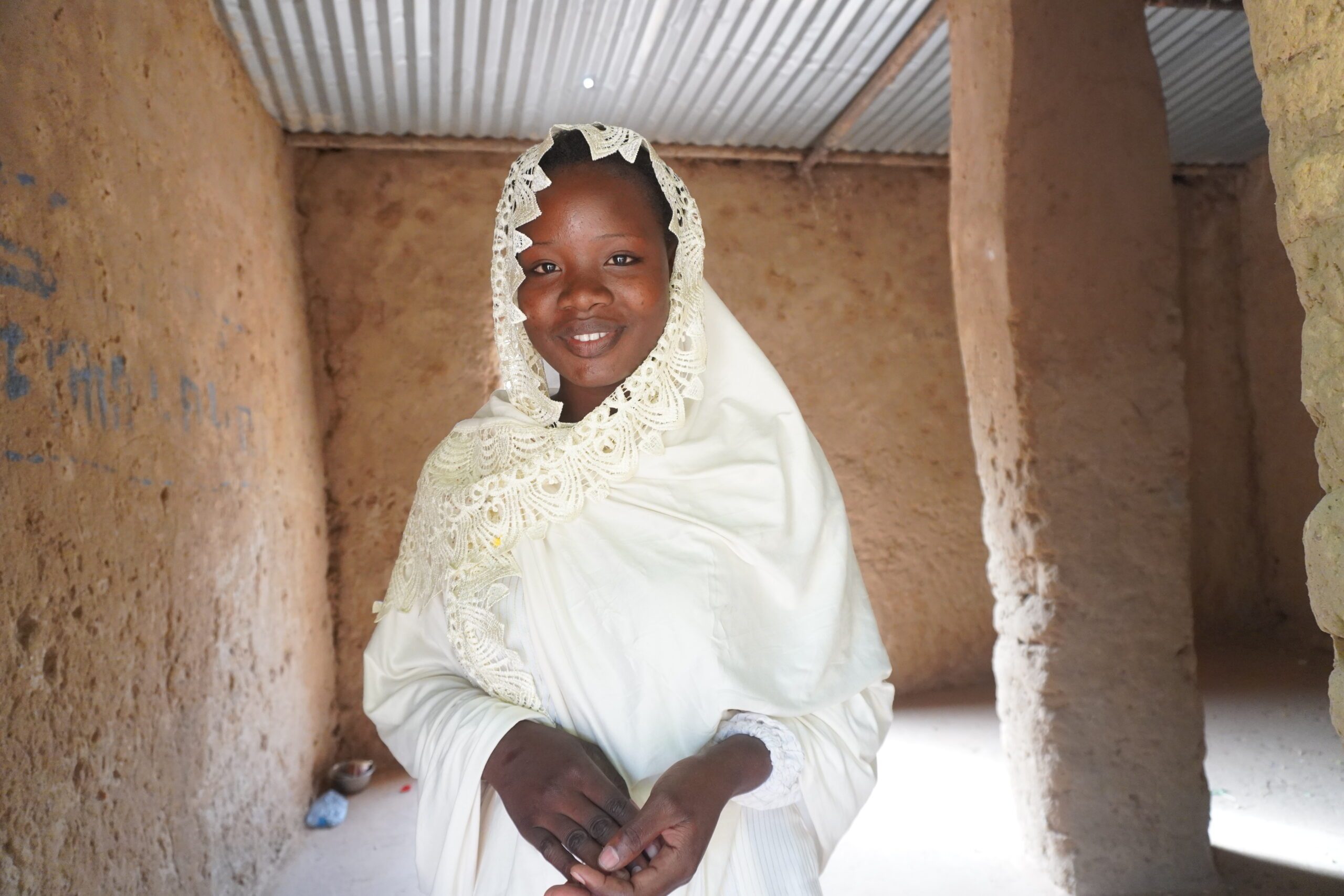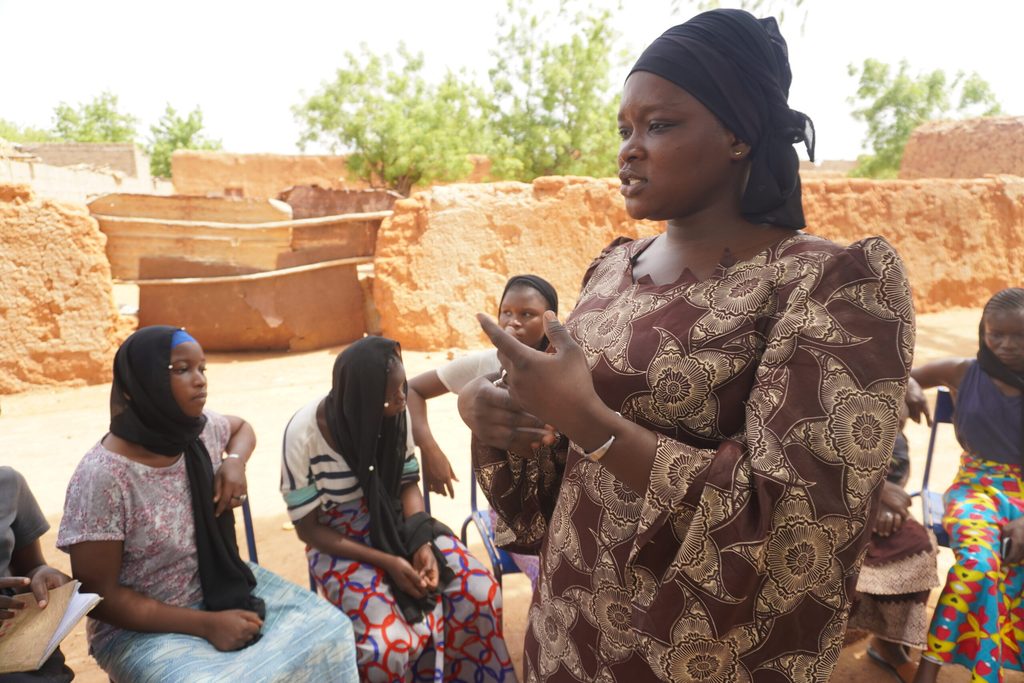Fatoumata leads change in her community
The World Economic Forum estimates it will take 131 years to reach gender equality. But we say, that’s just NOT good enough. Fatoumata's plan to Beat the Clock is to be a leader and make changes in her community.

Fatoumata standing at the front of her house. © Abdourahmane Coulibaly
In Mali, young girls and women groups are advocating for change in their communities and beyond. Girls like 17-year-old Fatoumata are confident and have the leadership skills to be role models for their peers, offering valuable advice and awareness on gender issues.
“For me, it’s important to be able to make things happen. Today, I have come to my old school to talk to the students about important issues that affect them,” says Fatoumata who tells us she wants to use her skills to make a difference. “My ambition is to be an accountant and become a leader in my community.”
Girls and young women lead their communities
Fatoumata is part of a group of girls and young women aged between 16 to 24, from rural and urban areas of Segou, Mopti et Tombouctou, who are working together, conducting advocacy within their communities to drive policy change on girls’ and young women’s participation.
The group members use peer education to teach other girls in their community about sexual and reproductive health and rights, intervene on the issues that concern them and take an active role in community decision-making processes.
In Mali, girls and young women continue to face discrimination in political, economic, social, cultural and educational spaces. Disproportionally affected by sexual and gender-based violence, girls and young women in Mali face enormous challenges and barriers. By bringing young women together from different areas, they can express themselves freely in a safe space.
“I would like to create an association that will focus on issues that affect teenagers in order to help them behave better and also to improve communication with their parents.”
Fatoumata
“Our group has 20 young women and since it started in 2021, we have taken part in several training sessions on issues such as early marriage, female genital mutilation and sexually transmitted diseases. The arrival of the project has been very beneficial. For my part, it has allowed me to assert myself and be more comfortable with public speaking,” shares Fatoumata.
The girl and young women groups have participated in a Plan programme called “She Leads”. Through this programme young women develop skills in mentoring, leadership and action on issues affecting girls and young women, and they then share their knowledge and ideas with other young people in their communities.

Girls are changing perceptions
The actions of these groups of young girls, whose objective is to promote equal rights and the place of women in society, are beginning to bear fruit. In many communities, there has been an increase in the number of women participating in community meetings such as roundtables and village councils, often addressing issues that were previously considered taboo.
In Segou, for the Mayor of Neguena Moussa Tangara it was very rare for girls to take part in community discussions and speak about the issues that affected them, but that is now changing. “The girls are now more comfortable with leaders at forums and take part in all sessions at the town hall. They have drawn up an action plan, some of which has been integrated into our community development plan. The community is investing in the girls by allocating them a quota of arable land where they can grow market garden vegetables, earning themselves an income to support their work. The girls are advocating at policy forums for representation at the community level. They have shown a real enthusiasm for development work and they are asserting themselves day by day.”
“My ambition is to be an accountant and become a leader in my community.”
Fatoumata
The presence of these 16 dynamic girls and women groups supported by Plan International in the project’s areas of intervention, has led to important decisions being made to help girls live their lives in safety. Issues that before were not on the agenda are now being openly debated thanks to the strong involvement of group members.
Fatoumata says that she wants to continue supporting girls and young people in her community, and wants to find ways to help teenagers cope with any challenges they might face.
“I would like to create an association that will focus on issues that affect teenagers in order to help them behave better and also to improve communication with their parents,” says Fatoumata who adds that since joining the She Leads project she now finds it easier to speak to her parents. “Before, communicating with them was very difficult and complicated.”
About the project
The global She Leads initiative is a 5-year (2021-2025) joint programme between Plan International, Defence for Children – DCI-ECPAT Netherlands, the African Women’s Development and Communication Network (FEMNET), Terre des Hommes Netherlands and the Dutch Ministry of Foreign Affairs under the Power of Voices framework. Equal Measures 2030 is a technical partner.
In Mali, Plan International is implementing the project in the regions of Ségou, Mopti and Timbuktu in partnership with the National NGOs A.SORO, YA-G-TU and CFOGRAD. A total of 16 groups have been set up since October 2021 comprised of 320 girls.
Beat the Clock
A girl gets no say, a girl gets no rights, a girl must ‘play to type’ – it’s a story as old as time.
But we say, that’s just NOT good enough.
The World Economic Forum estimates there will be 131 years until gender equality in the world for girls. That’s why we’re embarking on an unrelenting, collective mission to Beat the Clock; in order to inspire the world to come together, to learn, take action, donate, advocate, champion, speak up and speak out, as an ally to the cause. Every action counts in bringing about equality to all girls, everywhere.
We’ll keep fighting until we are all equal.
Categories: Campaigns, Youth empowerment


